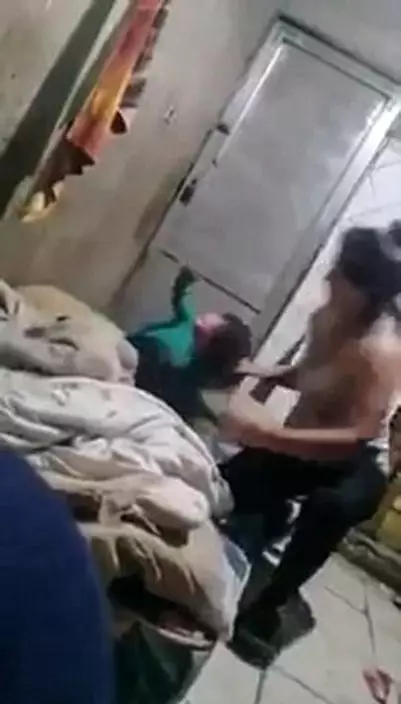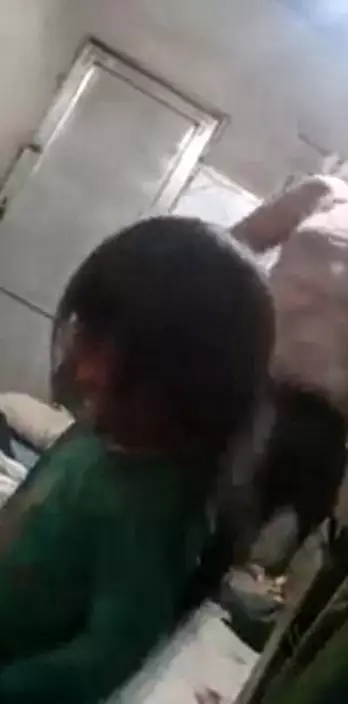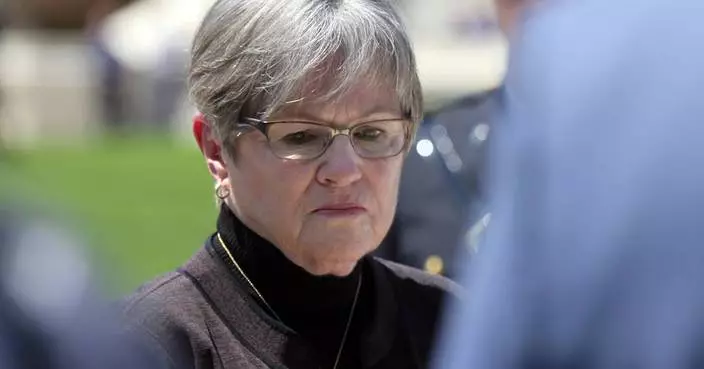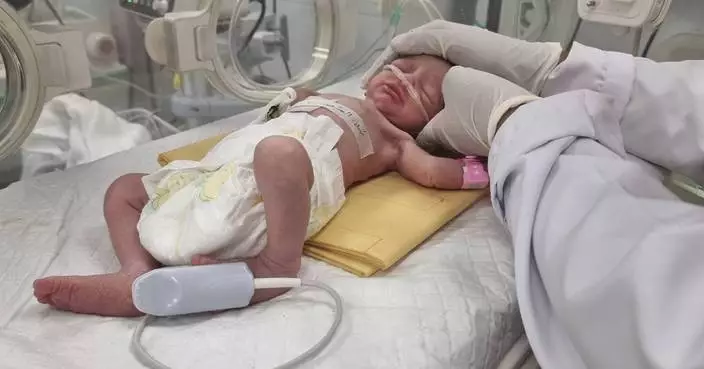A horrific footage emerged of a outrageous mother of three keeping abusing one of her child as she blamed the child on stealing her tablet.

The mother can seen slapping and hitting the child repeatedly at the beginning of the video. She accuses the girl of 'stealing' her tablet, shouting, 'Why don't you remember where you left the things? Give me the tablet, you had it here over the table when I arrived here. Give it to me because I will kill you.'

The terrified girl sobs and cowers when mother keeps on her abusive attack, lifting the girl up by her hair first and kicking her back.

The video was filmed in their home in the city of Bahia Blanca, Argentine, and uploaded on the social media. Many neitizens stepped in, calling to punish the mother.

Local media reports the three-year-old and her two younger siblings have since been removed from the home and now under the care of social services.
AUSTIN, Texas (AP) — The Biden administration wants to partially end a 27-year-old agreement that provides court oversight of how the federal government cares for migrant children in its custody.
The request to a U.S. district judge, filed Friday, comes weeks after the Health and Human Services Department published its own rule on safeguards, effective July 1, that Secretary Xavier Becerra said will set “clear standards for the care and treatment of unaccompanied (migrant) children.”
In a motion filed in California federal court, the government argued that the court supervision has outlived its purpose and new regulations are a better solution to ensure the safety of children.
“Twenty-seven years later, there is ample reason to believe that the (Flores Settlement Agreement's) goals have been achieved. The Court should terminate the FSA as to HHS,” the government wrote in its filing.
Children’s advocates say what is known as the Flores agreement has been instrumental in guaranteeing safe conditions for children, especially amid rising border detentions over the past two years that included nearly 300,000 unaccompanied minors.
Here is a look at the Flores agreement and why it matters:
The 1997 agreement was the result of over a decade of litigation between attorneys representing the rights of migrant children and the U.S. government over widespread allegations of mistreatment in the 1980s.
The original lawsuit was filed on behalf of four teenagers including Jenny Lisette Flores, a 15-year-old from El Salvador. The lawsuit detailed how Flores and the other plaintiffs were held by the government for extended periods of time, often in facilities with unrelated adults, and did not receive education or proper medical treatment.
The agreement set standards for the detention, treatment and release of minors. It mandates that migrant children be released without necessary delay to family, a child welfare program or an adult seeking custody if family reunification is not possible. The vast majority of children released in such cases go to close relatives while their immigration cases are ongoing.
If release is not possible due to safety concerns, the agreement says minors must be held in the least restrictive environment that is appropriate.
The agreement also sets standards for how licensed shelters must provide food, water, adult supervision, emergency medical services, toilets, sinks, temperature control and ventilation.
All of this was originally the responsibility of the U.S. Immigration and Naturalization Service. After reorganizations triggered by the attacks of Sept. 11, 2001, the care of migrant children was split between the Department of Homeland Security and the Office of Refugee Resettlement, which is part of Health and Human Services.
Generally speaking, children are the responsibility of Homeland Security after they're encountered crossing the border. Unaccompanied children are turned over to Health and Human Services within 72 hours and become that agency's responsibility. They often live in facilities designed specifically for children until they're released to a relative or guardian, a process that can take days, months or sometimes years.
Under the Flores agreement, lawyers representing migrant children have the ability to visit those facilities and document conditions. Over the years they have repeatedly reported problems.
The government moved to partially end court supervision, specifically for unaccompanied minors who are in Health and Human Services custody. The change won't affect the treatment of children beforehand by Homeland Security.
“My only guess for why they would want to do this now is because Flores counsel is a thorn in their side,” said Leecia Welch, deputy litigation director at Children’s Rights, which represents child migrants. “We can go into (their) facilities whenever we want, we can talk to the young people there, and when they’re out of compliance, we can file motions to enforce, and they don’t like that.”
The government says the new rule taking effect in July “implements and goes beyond” the standards spelled out under the Flores agreement. Among other things, it creates an independent ombudsman’s office, establishes minimum standards at temporary overflow shelters and formalizes advances in screening protocols for releasing children to families and sponsors and for legal services.
The 1997 settlement was not intended to last indefinitely, but rather until the creation of government regulations that meet the Flores standards.
The judge who oversees the Flores agreement would have to approve the government’s request.
Advocates for child migrants are expected to oppose the government's move, further straining President Joe Biden's relationship with immigration supporters during an election year when the topic is expected to be a central voting issue.
Jennifer Podkul, vice president of policy and advocacy at Kids In Need of Defense, said the group recognizes the government's efforts to create a rule similar to Flores but is concerned that it would remove third-party oversight for centers housing children.
“What I hope to see is that there is a commitment to transparency, any time a child is being held in government custody, to ensure that these kids who have already suffered so much trauma and so much harm are not being further harmed at the hands of the U.S. government,” Podkul said.
A key area of concern by advocates has been how facilities that house unaccompanied migrant children in Texas and Florida will be monitored if Flores goes away. Both states stopped licensing the facilities in their states but the new rule says Health and Human Services can continue to use facilities in those states.
The government argued in its motion Friday that because Texas and Florida have so many facilities for unaccompanied children, if the government stopped placing children in those two states it would result in “catastrophic loss of already limited bedspace.”
The government says facilities in those states would still have to meet certain standards and be subject to more monitoring and accreditation.
But for children's advocates those assurances aren't enough. Diane de Gramont is an attorney at the National Center for Youth Law and Flores counsel. She said the rules the government has put forward are certainly a big improvement. But she said the group has serious concerns that lifting the Flores agreement now would create a "big gap” in oversight of facilities in Florida and Texas. And the agency's lawyers would no longer be able to visit the sites and talk to the children to monitor conditions there.
An appeals court previously granted a Trump administration request to end Flores requirements for Health and Human Services in 2020, though the change never took effect. An attempt to lift oversight at Homeland Security at the same time was denied.
Santana reported from Washington.

FILE - In this July 9, 2019, file photo, immigrants line up in the dinning hall at the U.S. government's newest holding center for migrant children in Carrizo Springs, Texas. The Biden administration plans to partially end the 27-year-old court supervision of how the federal government cares for child migrants, shortly after producing its own list of safeguards against mistreatment. (AP Photo/Eric Gay, File)














